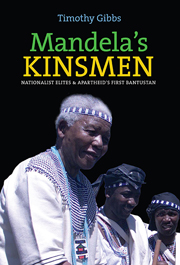Book contents
- Frontmatter
- Contents
- List of Maps and Figures
- Acknowledgements
- List of Abbreviations
- Introduction: Mandela' Kinsmen
- 1 Education, Monarchy & Nationalism
- 2 The First Bantustan, 1954–1963
- 3 The Second Peasants' Revolt, Mpondoland 1960–1980
- 4 The Old Mission Schools, 1963–1980
- 5 The Comrade-King, Bantustan Politics 1964–1980
- 6 Chris Hani's Guerrillas, 1974–1987
- 7 The Apartheid Endgame, 1987–1996
- 8 The New South Africa & Transkei's Collapse, 1990 onwards
- Conclusion: African Nationalism & its Fragments
- Bibliography
- Index
5 - The Comrade-King, Bantustan Politics 1964–1980
Published online by Cambridge University Press: 05 April 2014
- Frontmatter
- Contents
- List of Maps and Figures
- Acknowledgements
- List of Abbreviations
- Introduction: Mandela' Kinsmen
- 1 Education, Monarchy & Nationalism
- 2 The First Bantustan, 1954–1963
- 3 The Second Peasants' Revolt, Mpondoland 1960–1980
- 4 The Old Mission Schools, 1963–1980
- 5 The Comrade-King, Bantustan Politics 1964–1980
- 6 Chris Hani's Guerrillas, 1974–1987
- 7 The Apartheid Endgame, 1987–1996
- 8 The New South Africa & Transkei's Collapse, 1990 onwards
- Conclusion: African Nationalism & its Fragments
- Bibliography
- Index
Summary
The dispute on Robben Island
The rural unrest in the Mpondo districts of Transkei and the school revolts pointed towards deep discontents within the Bantustans, but for most of the 1960s and 1970s, the official opposition parties, who opposed Matanzima within the Transkei legislature, struggled to find their voice. For one, there was the problem of finding a political ideology and language that appealed to the diverse splinters of dissent. The young protestors in Transkei's schools made the most noise, but their schools were islands of anger. They had an uncertain relationship with more cautious, prosperous professionals, who made a good living inside Transkei's towns, but still disdained the racism inherent in the apartheid project. The well-educated dissidents were fully aware that they were a minority and that the most dramatic challenge to Matanzima's rule had not come from them but from the rural regions. Then there was the vexed question of how Transkei's political ideologies might link to the wider strands of black politics. The ANC had not returned to South Africa in any force since it had been crushed in the early 1960s. Black politics was in flux; a kaleidoscope of ideas, activities and projects. Finally, Kaiser Matanzima was notorious for ruthlessly squashing individuals whom he suspected of subversive dissent. Only a few academic researchers and journalists ventured off the main roads and down rutted tracks to speak to Transkei's dissidents who had been repeatedly imprisoned and banished into remote rural areas. They found a handful of men and women who spoke repeatedly of personal hardship, political setbacks and, worst of all, of their isolation.
- Type
- Chapter
- Information
- Mandela's KinsmenNationalist Elites and Apartheid's First Bantustan, pp. 91 - 110Publisher: Boydell & BrewerPrint publication year: 2014



